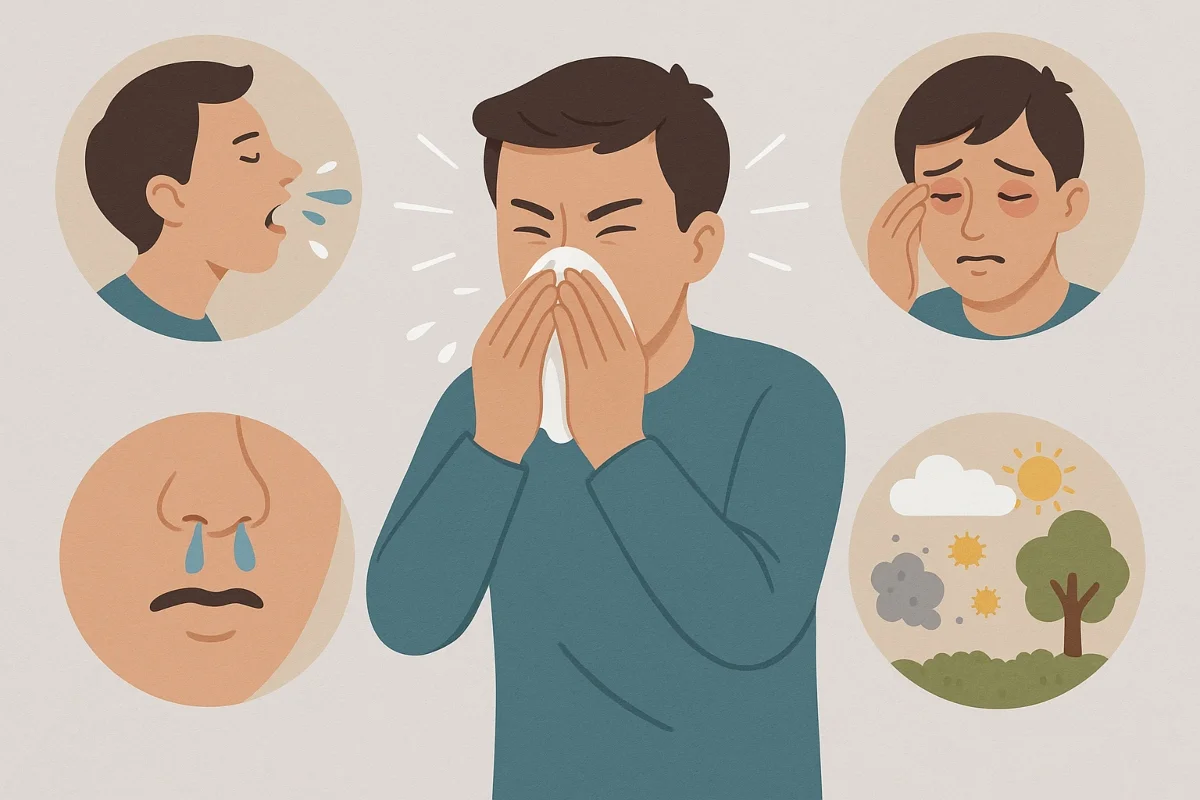It starts with a simple sneeze, then another, and suddenly, tissues become your closest companions. What feels like a passing irritation might actually be your body waving the Rhinitis warning flag.
When constant sneezing and watery eyes turn into daily guests, it’s time to listen closer. Let’s unravel when these quiet signals become serious and how to recognise the early Rhinitis symptoms before they take over your routine.
Recognising Rhinitis Symptoms: When to Pay Attention
Constant sneezing and watery eyes are not mere seasonal troubles. They often signal hidden nasal inflammation. Dr. Jeet Amin notes such Rhinitis symptoms as early body warnings, urging timely care and allergy sneezing remedies to prevent serious complications.
- Frequent sneezing – Sudden, repetitive sneezing fits, especially in the morning or near dust exposure.
- Runny nose – Clear discharge that worsens with temperature shifts or allergens.
- Itchy, watery eyes – Accompanied by redness or mild burning, often mistaken for eye strain.
- Triggered by dust, pollen, or weather – Environmental shifts amplify sensitivity, turning minor exposures into discomfort cycles.
Each symptom connects like a chain, reinforcing the body’s response to allergens and urging quick action against Rhinitis symptoms.
DON'T MISS
What Is Rhinitis? Understanding the Condition
Rhinitis occurs when the nasal lining becomes inflamed due to allergens, infections, or irritants. It is broadly classified as allergic or non-allergic based on its triggers. Pollen, dust, or animal dander cause allergic Rhinitis, while smoke, odours, or pollution trigger non-allergic types.
Seasonal allergic Rhinitis appears during pollen surges, whereas perennial ones persist indoors. Recognising early Rhinitis warning signs and identifying specific causes helps start timely care and ensure effective allergy sneezing remedies.
Sinusitis vs. Rhinitis: Key Differences You Must Know
Though they share overlapping signs, Sinusitis vs Rhinitis tells two different stories. Rhinitis involves nasal irritation and watery discharge, while Sinusitis extends inflammation into the facial sinuses, causing pain and pressure. Sinusitis induces congestion with thick mucus, whereas
Rhinitis brings clear discharge and itchy eyes. Both conditions require attention, but Rhinitis is further linked with frequent sneezing and watery eyes as body defence mechanisms. Distinguishing the two helps ensure the right treatment choices before infections take hold.
Precautionary Measures and Home Remedies
Managing Rhinitis warning signs begins with mindful prevention. Keep indoor air dust-free, avoid strong fragrances, and rinse your nose with saline regularly. Steam inhalation soothes irritated passages and promotes easy breathing.
Natural allergy sneezing remedies like honey, turmeric, or ginger tea calm inflammation. Maintaining balanced humidity helps limit triggers, reducing both frequency and intensity of Rhinitis symptoms.
Rhinitis Warning: When To Consult A Doctor
If constant sneezing and watery eyes persist despite care, or symptoms disturb sleep and appetite, medical help is key. Severe blockage, headaches, or prolonged discharge could indicate complications needing evaluation.
Delaying consultation may extend inflammation into the sinus cavities, worsening recovery. Early medical advice ensures effective allergy sneezing remedies and stops recurrence, helping you regain comfort and normal breathing quickly.
When sneezes feel endless and eyes won’t stop watering, listen closer. Your body might be repeating its loudest Rhinitis warning yet.
Disclaimer: This content, including advice, provides general information only. It is not a substitute for a qualified medical opinion in any way. The methods and claims mentioned in this article should be considered as suggestions only; DNP India neither confirms nor denies them. Always consult a doctor before following any such suggestions/treatments/medications/diets.
